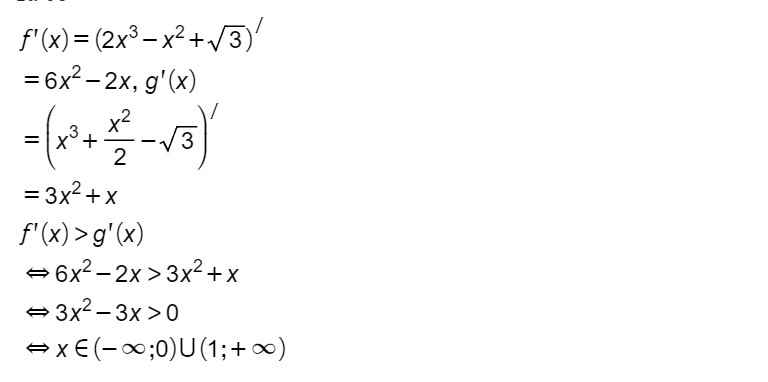Hãy nhập câu hỏi của bạn vào đây, nếu là tài khoản VIP, bạn sẽ được ưu tiên trả lời.

Lời giải:
a) Ta có f'(x) = 3x2 + 1, g(x) = 6x + 1. Do đó
f'(x) > g'(x) <=> 3x2 + 1 > 6x + 1 <=> 3x2 - 6x >0
<=> 3x(x - 2) > 0 <=> x > 2 hoặc x > 0 <=> x ∈ (-∞;0) ∪ (2;+∞).
b) Ta có f'(x) = 6x2 - 2x, g'(x) = 3x2 + x. Do đó
f'(x) > g'(x) <=> 6x2 - 2x > 3x2 + x <=> 3x2 - 3x > 0
<=> 3x(x - 1) > 0 <=> x > 1 hoặc x < 0 <=> x ∈ (-∞;0) ∪ (1;+∞).

\(\frac{tanx-1}{tanx+1}+cot2x=0\\ \Leftrightarrow cot2x-\frac{1-tanx\cdot tan\frac{\pi}{4}}{tanx+tan\frac{\pi}{4}}=0\\ \Leftrightarrow cot2x-cot\left(x+\frac{\pi}{4}\right)=0\)
d/
ĐKXĐ: \(\left\{{}\begin{matrix}sin2x\ne0\\tanx\ne-1\end{matrix}\right.\) \(\Rightarrow\left\{{}\begin{matrix}x\ne\frac{k\pi}{2}\\x\ne-\frac{\pi}{4}+k\pi\end{matrix}\right.\)
\(\Leftrightarrow\left[{}\begin{matrix}\frac{tanx-1}{tanx+1}+cot2x=0\\3tanx-\sqrt{3}=0\end{matrix}\right.\)
\(\Leftrightarrow\left[{}\begin{matrix}\frac{tanx-1}{tanx+1}-\frac{tan^2x-1}{2tanx}=0\\tanx=\frac{\sqrt{3}}{3}\end{matrix}\right.\)
\(\Leftrightarrow\left[{}\begin{matrix}\left(tanx-1\right)\left(\frac{1}{tanx+1}-\frac{tanx+1}{2tanx}\right)=0\left(1\right)\\x=\frac{\pi}{6}+k\pi\end{matrix}\right.\)
Xét (1): \(\Leftrightarrow\left[{}\begin{matrix}tanx=1\Rightarrow x=\frac{\pi}{4}+k\pi\\\frac{1}{tanx+1}-\frac{tanx+1}{2tanx}=0\left(2\right)\end{matrix}\right.\)
Xét (2)
\(\Leftrightarrow\left(tanx+1\right)^2-2tanx=0\)
\(\Leftrightarrow tan^2x+1=0\left(vn\right)\)

\(C'=0\) với mọi hằng số C
nguyen thi khanh nguyen
\(f'\left(x\right)=6x^2-2x\)
\(g'\left(x\right)=3x^2+x\)
\(f'\left(x\right)>g'\left(x\right)\Leftrightarrow6x^2-2x>3x^2+x\)
\(\Leftrightarrow3x^2-3x>0\Rightarrow\left[{}\begin{matrix}x>1\\x< 0\end{matrix}\right.\)

2/
\(\Leftrightarrow3sinx-4sin^3x-\sqrt{3}cosx=2sinx\)
\(\Leftrightarrow4sin^3x-sinx+\sqrt{3}cosx=0\)
Nhận thấy \(cosx=0\) ko phải nghiệm, chia 2 vế cho \(cos^3x\)
\(\Leftrightarrow4tan^3x-tanx\left(1+tan^2x\right)+\sqrt{3}\left(1+tan^2x\right)=0\)
\(\Leftrightarrow3tan^3x+\sqrt{3}tan^2x-tanx+\sqrt{3}=0\)
Bạn xem lại đề, pt bậc 3 này ko giải được (nghiệm rất xấu)
1.
\(\Leftrightarrow\sqrt{3}cos^2x-\sqrt{3}+cos^2x+\left(\sqrt{3}-1\right)sinx.cosx+sinx-cosx=0\)
\(\Leftrightarrow-\sqrt{3}sin^2x+cosx+\left(\sqrt{3}-1\right)sinx.cosx+sinx-cosx=0\)
\(\Leftrightarrow\left(cosx-sinx\right)\left(cosx+\sqrt{3}sinx\right)-\left(cosx-sinx\right)=0\)
\(\Leftrightarrow\left(cosx-sinx\right)\left(cosx+\sqrt{3}sinx-1\right)=0\)
\(\Leftrightarrow\left(sinx-cosx\right)\left(\frac{1}{2}cosx+\frac{\sqrt{3}}{2}sinx-\frac{1}{2}\right)=0\)
\(\Leftrightarrow\sqrt{2}sin\left(x-\frac{\pi}{4}\right)\left[sin\left(x+\frac{\pi}{6}\right)-\frac{1}{2}\right]=0\)
\(\Leftrightarrow\left[{}\begin{matrix}sin\left(x-\frac{\pi}{4}\right)=0\\sin\left(x+\frac{\pi}{6}\right)=\frac{1}{2}\end{matrix}\right.\)

a) Đk: sinx \(\ne\)0<=>x\(\ne\)k\(\Pi\)
pt<=>\(\sqrt{3}\)(1-cos2x)-cosx=0
<=>\(\sqrt{3}\)[1-(2cos2x-1)]-cosx=0
<=>2\(\sqrt{3}\)-2\(\sqrt{3}\)cos2x-cosx=0
<=>\(\left\{{}\begin{matrix}cosx=\dfrac{\sqrt{3}}{2}\\cosx=-\dfrac{2\sqrt{3}}{3}< -1\left(loai\right)\end{matrix}\right.\)
tới đây bạn tự giải cho quen, chứ chép thì thành ra không hiểu gì thì khổ
b)pt<=>2sin2x+2sin2x=1
<=>2sin2x+2sin2x=sin2x+cos2x
<=>4sinx.cosx+sin2x-cos2x=0
Tới đây là dạng của pt đẳng cấp bậc 2, ta thấy cosx=0 không phải là nghiệm của pt nên ta chia cả hai vế của pt cho cos2x:
pt trở thành:
4tanx+tan2x-1=0
<=>\(\left[{}\begin{matrix}tanx=-2+\sqrt{2}\\tanx=-2-\sqrt{5}\end{matrix}\right.\)
<=>\(\left[{}\begin{matrix}x=arctan\left(-2+\sqrt{5}\right)+k\Pi\\x=arctan\left(-2-\sqrt{5}\right)+k\Pi\end{matrix}\right.\)(k thuộc Z)
Chú ý: arctan tương ứng ''SHIFT tan'' (khi thử nghiệm trong máy tính)
c)Đk: cosx\(\ne\)0<=>x\(\ne\)\(\dfrac{\Pi}{2}\)+kpi
pt<=>cos2x+\(\sqrt{3}\)sin2x=1
<=>1-sin2x+\(\sqrt{3}\)sin2x-1=0
<=>(\(\sqrt{3}\)-1)sin2x=0
<=>sinx=0<=>x=k\(\Pi\)(k thuộc Z)
d)
pt<=>\(\sqrt{3}\)sin7x-cos7x=\(\sqrt{2}\)
Khúc này bạn coi SGK trang 35 người ta giả thích rõ ràng rồi
pt<=>\(\dfrac{\sqrt{3}}{2}\)sin7x-\(\dfrac{1}{2}\)cos7x=\(\dfrac{\sqrt{2}}{2}\)
<=>sin(7x-\(\dfrac{\Pi}{3}\))=\(\dfrac{\sqrt{2}}{2}\)
<=>sin(7x-\(\dfrac{\Pi}{3}\))=sin\(\dfrac{\Pi}{4}\)
Tới đây bạn tự giải nhé, giải ra nghiệm rồi kiểm tra xem nghiệm nào thuộc khoảng ( đề cho) rồi kết luận
Câu d) mình nhầm nhé
<=>sin(7x-\(\dfrac{\Pi}{6}\))=\(\dfrac{\sqrt{2}}{2}\) mới đúng sorry

\(a=\lim\limits_{x\rightarrow a}\frac{\left(\sqrt{x}-\sqrt{a}\right)\left(x+\sqrt{ax}+a\right)}{\sqrt{x}-\sqrt{a}}=\lim\limits_{x\rightarrow a}\left(x+\sqrt{ax}+a\right)=3a\)
\(b=\lim\limits_{x\rightarrow1}\frac{x^{\frac{1}{n}}-1}{x^{\frac{1}{m}}-1}=\lim\limits_{x\rightarrow1}\frac{\frac{1}{n}x^{\frac{1-n}{n}}}{\frac{1}{m}x^{\frac{1-m}{m}}}=\frac{\frac{1}{n}}{\frac{1}{m}}=\frac{m}{n}\)
Ta có:
\(\lim\limits_{x\rightarrow1}\frac{1-\sqrt[n]{x}}{1-x}=\lim\limits_{x\rightarrow1}\frac{1-x^{\frac{1}{n}}}{1-x}=\lim\limits_{x\rightarrow1}\frac{-\frac{1}{n}x^{\frac{1-n}{n}}}{-1}=\frac{1}{n}\)
\(\Rightarrow c=\lim\limits_{x\rightarrow1}\frac{\left(1-\sqrt{x}\right)}{1-x}.\frac{\left(1-\sqrt[3]{x}\right)}{\left(1-x\right)}.\frac{\left(1-\sqrt[4]{x}\right)}{\left(1-x\right)}.\frac{\left(1-\sqrt[5]{x}\right)}{\left(1-x\right)}=\frac{1}{2}.\frac{1}{3}.\frac{1}{4}.\frac{1}{5}=\frac{1}{120}\)
\(d=\lim\limits_{x\rightarrow+\infty}\frac{\sqrt{x+\sqrt{x}}}{\sqrt{x+\sqrt{x+\sqrt{x}}}+\sqrt{x}}=\lim\limits_{x\rightarrow+\infty}\frac{\sqrt{1+\frac{1}{\sqrt{x}}}}{\sqrt{1+\sqrt{\frac{1}{x}+\frac{1}{x\sqrt{x}}}}+1}=\frac{1}{2}\)
\(e=\lim\limits_{x\rightarrow0}\frac{\sqrt{1+x}-1+1-\sqrt[3]{1+x}}{x}=\lim\limits_{x\rightarrow0}\frac{\frac{x}{\sqrt{1+x}+1}+\frac{x}{1+\sqrt[3]{1+x}+\sqrt[3]{\left(1+x\right)^2}}}{x}\)
\(=\lim\limits_{x\rightarrow0}\left(\frac{1}{\sqrt{1+x}+1}+\frac{1}{1+\sqrt[3]{1+x}+\sqrt[3]{\left(1+x\right)^2}}\right)=\frac{1}{2}+\frac{1}{3}=\frac{5}{6}\)
\(f=\lim\limits_{x\rightarrow2}\frac{\sqrt[3]{8x+11}-3+3-\sqrt{x+7}}{\left(x-1\right)\left(x-2\right)}=\lim\limits_{x\rightarrow2}\frac{\frac{8\left(x-2\right)}{\sqrt[3]{\left(8x+11\right)^2}+3\sqrt[3]{8x+11}+9}-\frac{x-2}{3+\sqrt{x+7}}}{\left(x-1\right)\left(x-2\right)}\)
\(=\lim\limits_{x\rightarrow2}\frac{\frac{8}{\sqrt[3]{\left(8x+11\right)^2}+3\sqrt[3]{8x+11}+9}-\frac{1}{3+\sqrt{x+7}}}{x-1}=\frac{8}{27}-\frac{1}{6}=\frac{7}{54}\)
\(g=\lim\limits_{x\rightarrow1}\frac{\sqrt[3]{3x-2}-1+1-\sqrt{2x-1}}{\left(x-1\right)\left(x^2+x+1\right)}=\lim\limits_{x\rightarrow1}\frac{\frac{3\left(x-1\right)}{\sqrt[3]{\left(3x-2\right)^2}+\sqrt[3]{3x-2}+1}-\frac{2\left(x-1\right)}{1+\sqrt{2x-1}}}{\left(x-1\right)\left(x^2+x+1\right)}\)
\(=\lim\limits_{x\rightarrow1}\frac{\frac{3}{\sqrt[3]{\left(3x-2\right)^2}+\sqrt[3]{3x-2}+1}-\frac{2}{1+\sqrt{2x-1}}}{x^2+x+1}=0\)
\(h=\lim\limits_{x\rightarrow1}\frac{\sqrt[3]{x+9}+\sqrt[3]{2x-6}}{x^3+1}=\frac{\sqrt[3]{10}-\sqrt[3]{4}}{2}\)

\(g'=2\left(\sqrt{x+3}\right)^2.\left(\sqrt{x+3}\right)'=2\left(x+3\right).\dfrac{1}{2\sqrt{x+3}}=\sqrt{x+3}\)
\(g'\left(x\right)+\sqrt{2x-1}=3\Leftrightarrow\sqrt{x+3}+\sqrt{2x-1}=3\)
\(DKXD:x\ge\dfrac{1}{2}\)
\(pt\Leftrightarrow x+3+2x-1+2\sqrt{\left(x+3\right)\left(2x-1\right)}=9\)
\(\Leftrightarrow2\sqrt{\left(x+3\right)\left(2x-1\right)}=7-3x\)
\(\Leftrightarrow4\left(2x^2+5x-3\right)=49-42x+9x^2\)
\(\Leftrightarrow x^2-62x+61=0\Leftrightarrow\left[{}\begin{matrix}x=61\left(loai\right)\\x=1\end{matrix}\right.\)
g'(x) = \(\sqrt{x+3}\)
ta có phương trình : \(\sqrt{x+3}\) + \(\sqrt{2x-1}\) =3 ( ĐK : x\(\ge\)\(\dfrac{1}{2}\))
\(\Leftrightarrow\) x+3 +2x-1 +\(2\sqrt{\left(x+3\right)\left(2x-1\right)}\) = 9
\(\Leftrightarrow\) \(2\sqrt{\left(x+3\right)\left(2x-1\right)}\) = 7-3x
\(\Leftrightarrow\) 4(2x2 +5x -3) = 49 - 42x +9x2
\(\Leftrightarrow\) x2 - 62x +61 = 0 \(\left\{{}\begin{matrix}x=61\\x=1\end{matrix}\right.\)